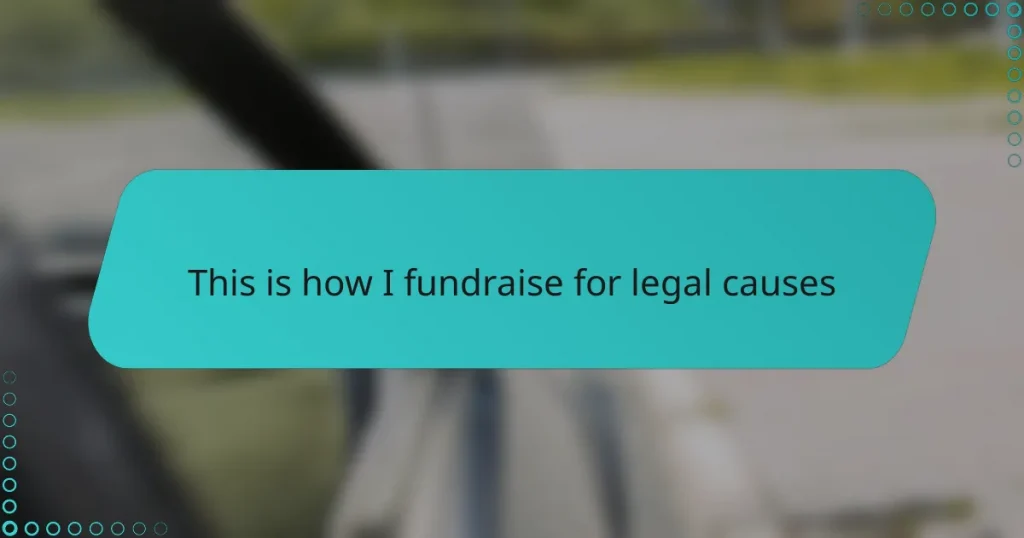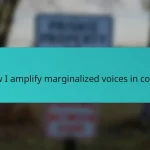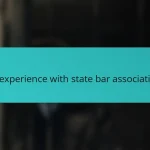Key takeaways
- Legal advocacy fundraising emphasizes transparency and storytelling to connect with donors and build lasting relationships.
- Engagement of supporters through active participation fosters a sense of ownership and deepens commitment to the cause.
- Effective campaign planning includes setting specific goals, creating timelines, and tailoring messages to different audiences.
- Managing funds requires accountability and prioritization, ensuring resources are directed towards efforts that yield tangible results.
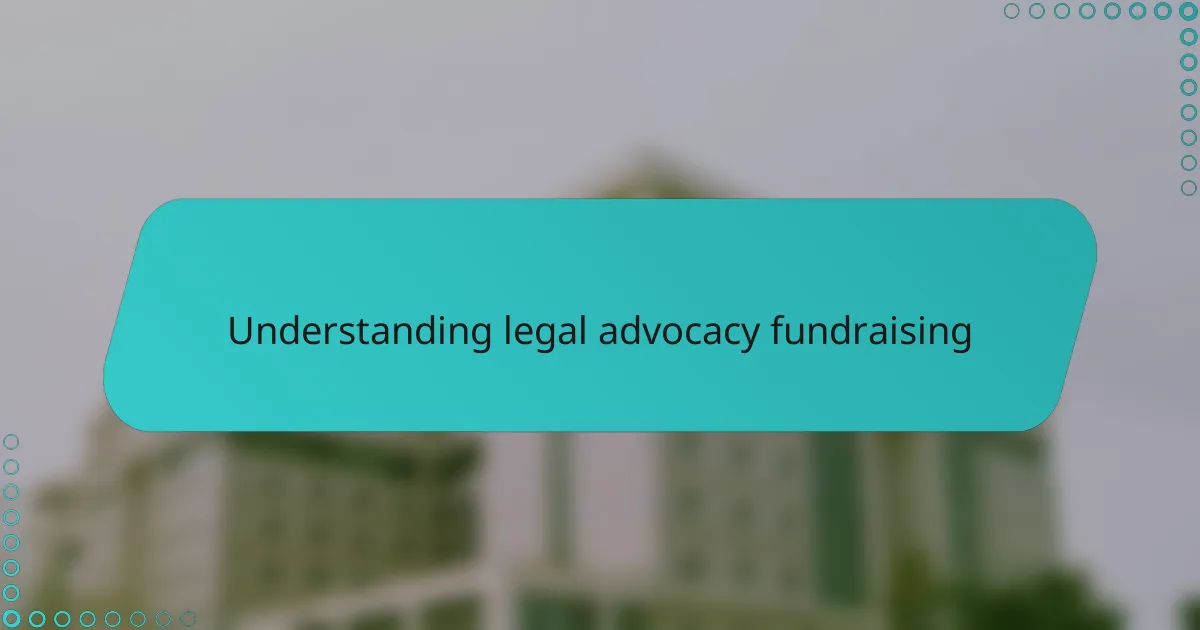
Understanding legal advocacy fundraising
Legal advocacy fundraising, in my experience, is more than just raising money—it’s about rallying support for justice. When I’ve reached out to donors, I realized people connect deeply when they understand the impact their contributions will have on real legal battles. Have you ever noticed how sharing stories about those whose rights are defended makes fundraising feel meaningful rather than transactional?
I’ve found that transparency plays a crucial role in building trust with supporters. By clearly explaining how funds will be used—whether for litigation costs, community education, or policy reform—donors feel valued and motivated to continue giving. Isn’t it powerful when you see a network of advocates come together because they believe in a cause, not just a campaign?
Another insight I’ve gained is the emotional weight carried by legal advocacy fundraising. It’s not easy carrying the stories of individuals facing injustice, yet this is precisely what fuels the passion behind every fundraiser. When I talk to potential supporters, I often ask myself: how can I convey this urgency without overwhelming them, so they feel inspired to act rather than paralyzed?
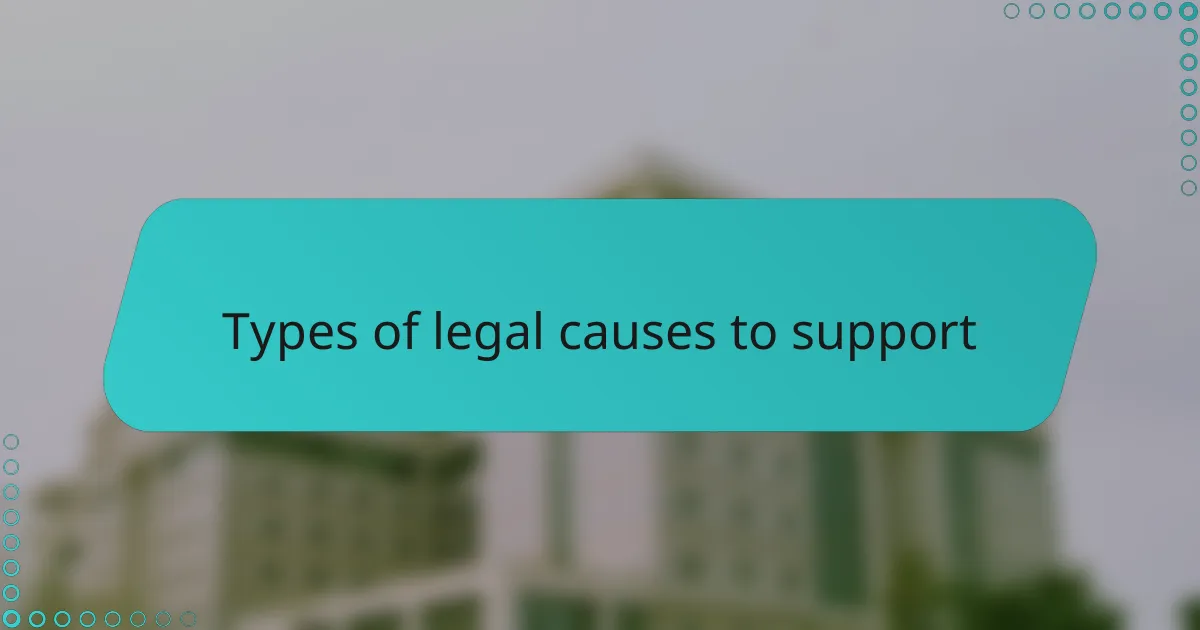
Types of legal causes to support
When choosing which legal causes to support, I often find myself drawn to those that protect fundamental rights—think freedom of speech, equal justice, or civil liberties. These causes resonate with me because they shape the very foundation of a fair society. Have you ever felt that urge to defend something bigger than yourself, something that affects everyone’s daily life?
Environmental justice is another area I’ve grown passionate about. Supporting legal efforts to hold polluters accountable or safeguarding communities from environmental harm feels like fighting for the planet’s future. It’s hard not to be moved by stories of families facing toxic threats, and I’ve seen how donors respond when they realize their contributions are helping voices be heard in court.
Then there are criminal justice reform cases, which often pull at my heartstrings the most. Helping to fund initiatives that challenge wrongful convictions or advocate for fair sentencing reminds me that justice isn’t always blind—sometimes it needs a push. Have you noticed how these stories highlight the personal struggles behind legal battles, making the cause feel urgent and deeply human?
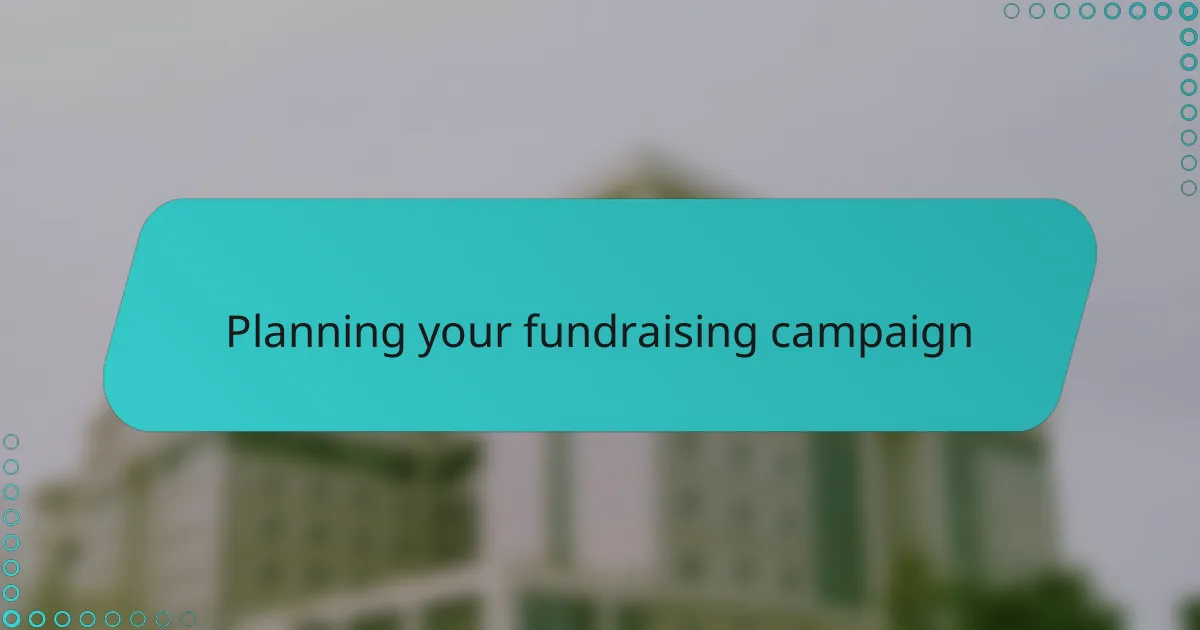
Planning your fundraising campaign
Planning your fundraising campaign begins with setting clear, achievable goals. In my experience, knowing exactly what you’re raising money for helps shape your entire approach and makes it easier to communicate with potential donors. Have you ever tried to rally support without a specific target? It rarely works as well.
I also like to map out a timeline that includes key milestones. This not only keeps me organized but also creates a sense of momentum that I can share with supporters. When you break down a big goal into smaller steps, does it feel less daunting and more actionable?
Finally, identifying your audience is crucial. When I tailor messages to different groups—whether it’s individuals passionate about social justice or organizations focused on policy change—I notice a stronger connection. Who do you think would be moved by your cause, and what stories will resonate most with them?
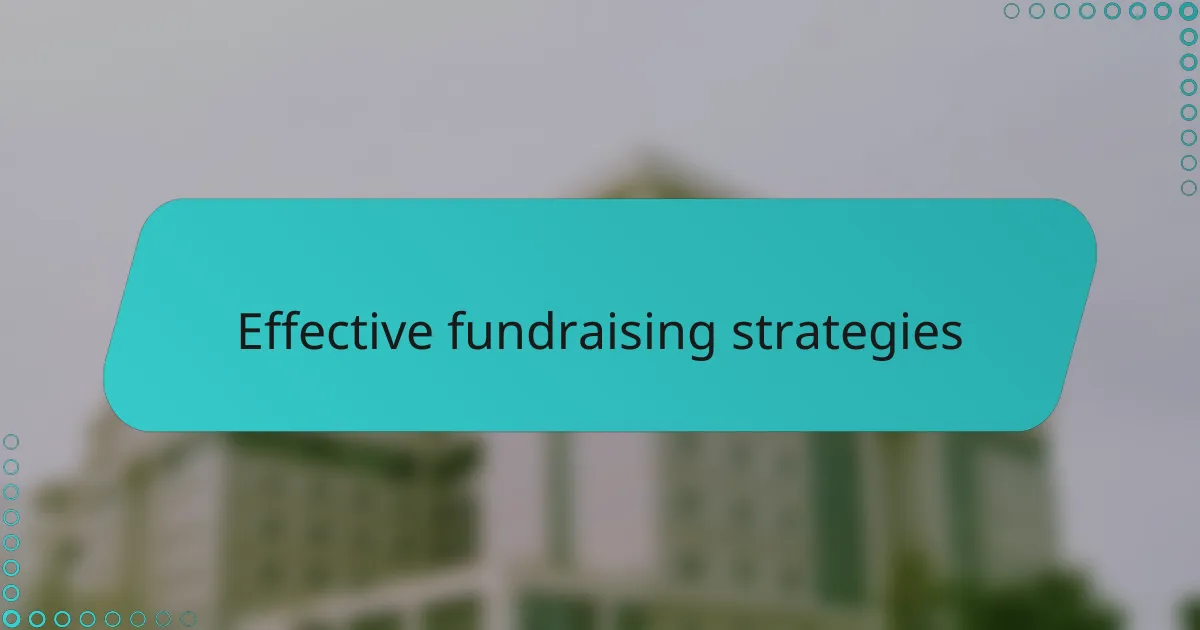
Effective fundraising strategies
One strategy I find incredibly effective is leveraging storytelling across multiple platforms. When I share compelling narratives about real people affected by legal issues, I notice it sparks empathy and commitment. Have you ever felt that a single story can shift someone’s perspective more than any statistic ever could?
I also rely heavily on building a community around the cause. Creating spaces where supporters can connect, ask questions, and celebrate small victories together makes fundraising feel like a shared mission rather than a solo effort. It makes me wonder—how often do we forget that people want to be part of something bigger, not just write a check?
Another tactic I’ve used is setting up recurring donation options. It may seem simple, but encouraging donors to commit monthly creates sustained support that feels predictable and reliable. From my experience, this approach builds relationships over time, transforming one-time givers into lifelong advocates. Have you tried this yet? It might just change the way you fundraise.
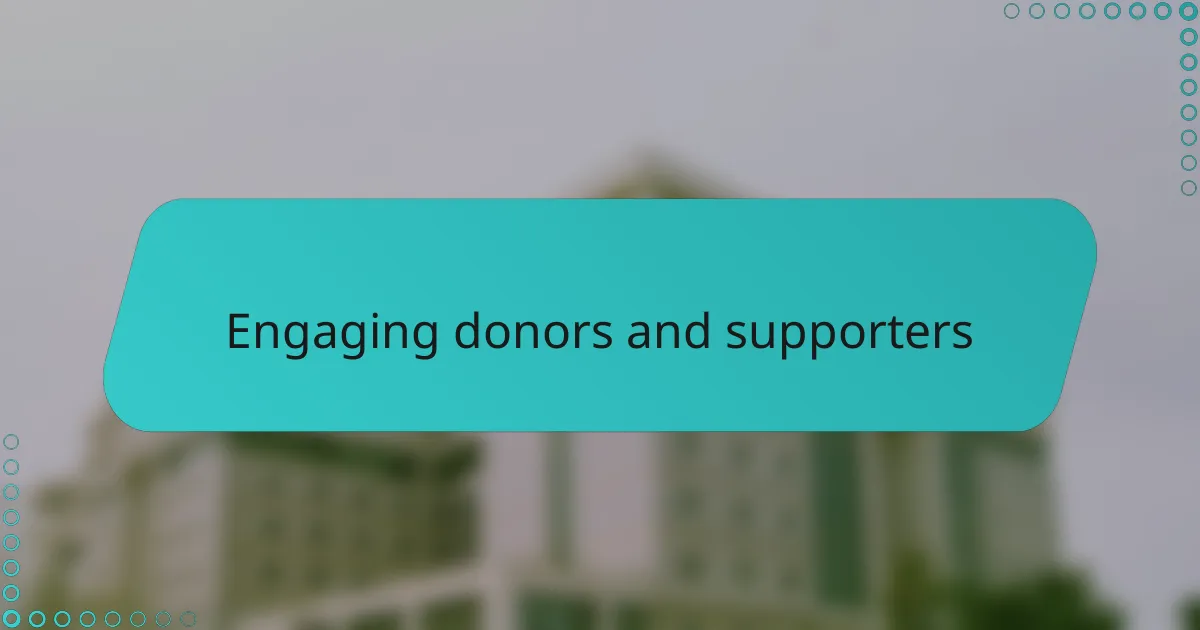
Engaging donors and supporters
Engaging donors and supporters often starts with genuine conversations. I remember reaching out to a longtime donor not just to ask for money, but to listen—hear their motivations, their concerns—which made our connection feel authentic and lasting. Have you noticed how donors appreciate feeling heard as much as, if not more than, being asked to give?
I also find that inviting supporters to participate beyond donations deepens their commitment. Whether it’s attending a webinar, sharing a story on social media, or even volunteering time, these small acts turn passive donors into active advocates. Isn’t it amazing how involvement creates a sense of ownership and pride in the cause?
Transparency about impact is another key. When I share updates—like a recent court victory or a stalled policy change—I see donors’ enthusiasm reignite. They want to know their support truly makes a difference, not just tonight but in the long run. How often do we check back with supporters? From my experience, regular communication keeps hope alive and hands reaching deeper into pockets.
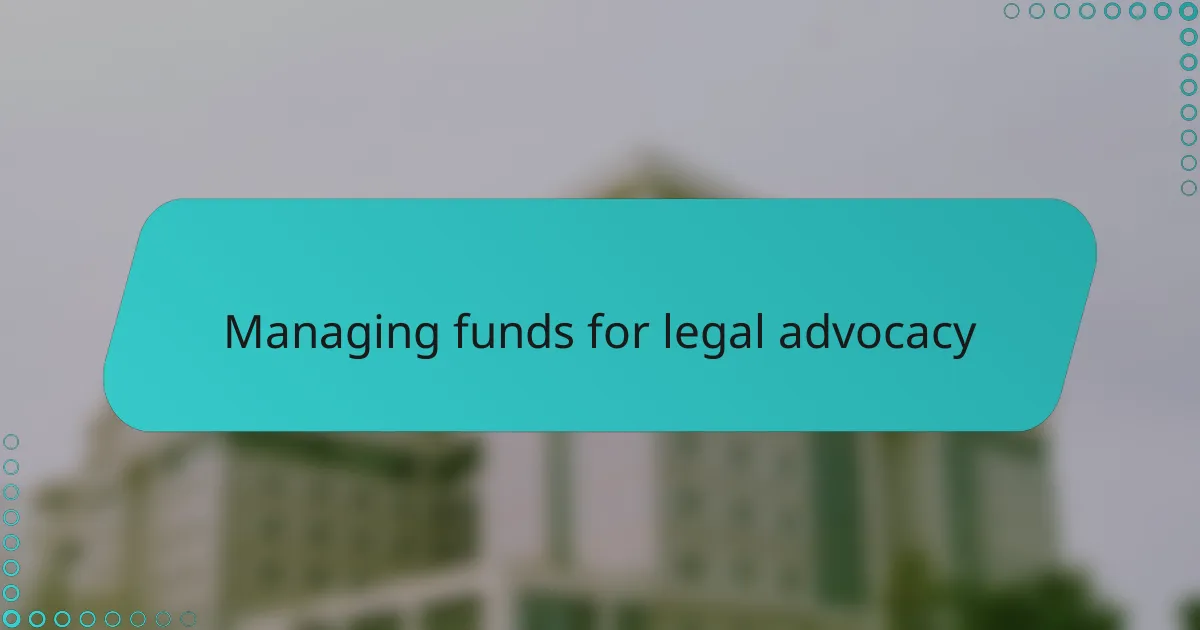
Managing funds for legal advocacy
Managing funds for legal advocacy requires a careful balance between accountability and flexibility. In my experience, setting up a transparent tracking system early on not only reassures donors but also helps me monitor where every dollar goes, whether it’s courtroom fees or outreach efforts. Have you ever felt more confident supporting a cause knowing exactly how your contribution is making an impact?
I’ve learned that regularly reviewing budgets with the team prevents unexpected shortfalls that can stall critical work. Sometimes, despite the passion behind a case, money can become a bottleneck, and having a clear financial plan ensures we keep pushing forward. How often do we underestimate the importance of financial discipline in advocacy?
Another insight I can share is about prioritizing spending without compromising the cause’s integrity. When resources are tight, deciding between media campaigns or direct legal assistance can be tough. But focusing on what drives the most tangible results—like winning a key motion or educating affected communities—has made all the difference for me. What would you prioritize if you had to make these calls?
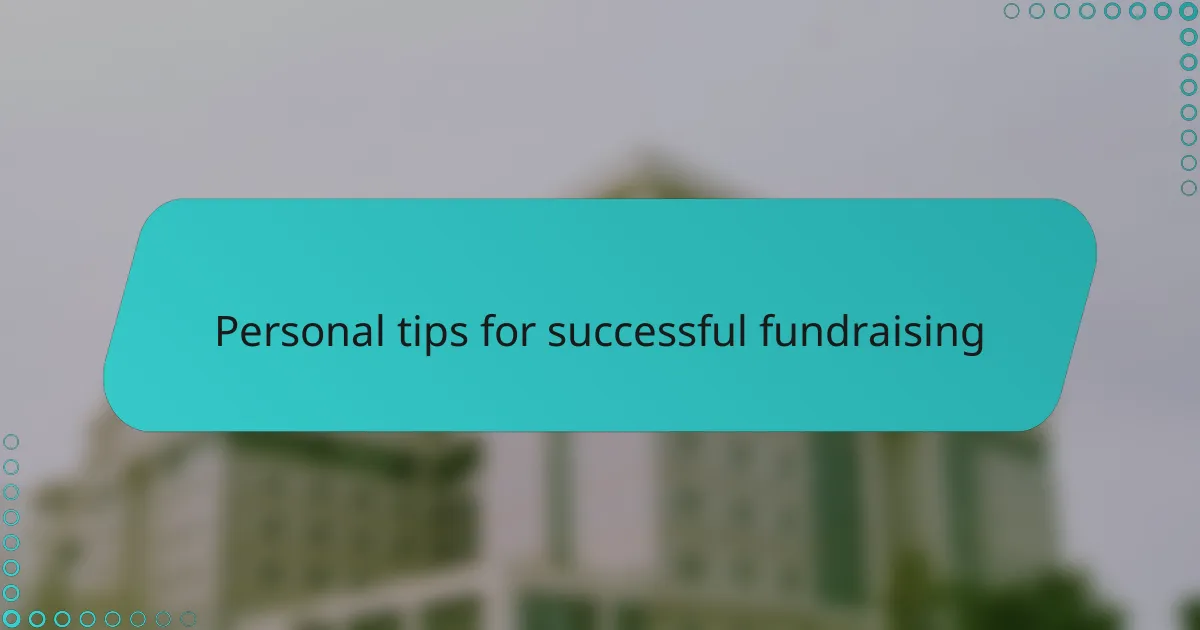
Personal tips for successful fundraising
I’ve found that personalizing my asks makes all the difference. When I reach out, I try to connect each donation to a specific individual or outcome, which transforms a simple request into a meaningful appeal. Have you ever felt the shift when a donor realizes they’re not just funding a cause, but changing a life?
Keeping things simple and honest also opens doors. I avoid jargon and overcomplicating the ask because people respond better when they understand exactly what their money supports. From my experience, clarity breeds trust and encourages ongoing generosity.
Lastly, I always remind myself to celebrate the small wins with my supporters. Sharing progress—even tiny steps forward—creates momentum and keeps everyone motivated. Isn’t it encouraging to see how each contribution, no matter the size, pushes the cause closer to justice?
